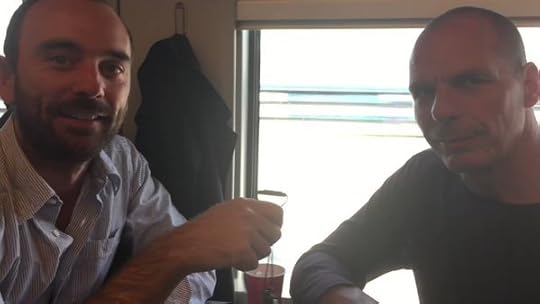Yanis Varoufakis's Blog, page 118
October 24, 2017
Interview for VOX with Sean Illing, occasioned by ‘Adults in the Room’
Those aren’t the words of Donald Trump or Bernie Sanders. They’re from someone who watched his nation get hammered first by a financial crisis not solely of its own making and then by a heavy-handed international push to bully his government into accepting draconian spending cuts that ravaged the lives of millions of his fellow citizens.
That person is Yanis Varoufakis, a self-described “erratic Marxist” who served as the Greek finance minister when European leaders forced through dramatic tax hikes and spending cuts in exchange for the emergency loans Athens needed to make payments on more than 350 billion dollars of debt.
According to Varoufakis, this was a short-term move that saved the banks but decimated regular people and failed to solve any of the underlying problems with the financial system. “They had to couch their actions in false narratives and cover up previous crimes with new crimes,” he told me in an interview tied to the publication of his memoir, Adults in the Room: My Battle with Europe’s Deep Establishment. “They became prisoners of their own devices, trapped in a cage they had all built.”
Varoufakis believes that growing public fury over the way Western governments protect the global financial system could lead to the election of more demagogues like President Donald Trump and spark more European nations to consider Brexits of their own.
Our full conversation, lightly edited for clarity, appears below.
Sean Illing
You start your book by comparing the financial crisis in Europe to a Greek tragedy. Why so ominous?
Yanis Varoufakis
The essence of tragedy is when people are desperately trying to do what’s right but are trapped in circumstances that forbid it. I wrote this book because I think this is what has happened to Europe. I was locked in a confrontation with some of the most powerful organizations and institutions in the world, and yet the individuals making the decisions were, for the most part, caught up in a machine over which they had no control.
Sean Illing
You call the global financial system “an inhuman, mostly unseen network of power relations.” In the least abstract way possible, tell me what you think went wrong?
Yanis Varoufakis
During the period of deregulation, which began on Wall Street in the 1990s and came to crescendo under Bill Clinton, the banks suddenly realized that they had monstrous capacities to print money.
It was like having their own ATM with no constraints, no limits. Of course, that requires also an ideology that allows them to feel good about what they were doing, to feel like they weren’t jeopardizing anyone. This is the ideology of neoliberalism, and it produced the financial economic models that spawned a whole new species of “riskless risk” — if you recall that magnificently stupid phrase from the 1990s.
Sean Illing
This idea of “riskless risk” sounds like a perfect assumption on which to build an economic house of cards.
Yanis Varoufakis
That’s exactly right. The people who bought into this believe we had a new paradigm that allowed to banks to create value out of nothing and to do it safely. At the same time, politicians were impressed with all this money making, as it helped their careers and financed their campaigns. The ones with a greater public service conscience were also impressed by how the financial sector’s taxes could pay for the welfare state, especially in places like in Britain and in Germany.
But I argue in the book that they were hoodwinked by this system of financialization and that in 2008 we all got our comeuppance. All those pyramids, all those Ponzi schemes came crashing down, and the politicians who didn’t see it coming panicked just as the bankers panicked.
Sean Illing
And the response was basically to paper over previous mistakes with more mistakes?
Yanis Varoufakis
They went through a sequence of short-term moves to save their bacon and the bacon of those who were financing them in the financial sector. But every time they did that, every time they saved the bankers, they alienated themselves from their electors, from the actual citizens. They had to couch their actions in false narratives and cover up previous crimes with new crimes.
They became prisoners of their own devices, trapped in a cage they had all built.
THE YOUNG ARE TRYING TO PRIVATIZE THEIR DREAMS BY IMAGINING THAT IF THEY WORK VERY HARD THEY WOULD PRODUCE THE NEXT KILLER APP AND BECOME BILLIONAIRES
Sean Illing
Are Europe’s financial problems fundamentally different than America’s? Obviously, we live in a globalized economy, but Europe seems especially ill-equipped to respond to financial crises.
Yanis Varoufakis
The thing about the United States is that you’ve always had very pragmatic elites that sit around a table when a crisis like that of 2008 takes place and ask themselves the pertinent question, which is, “How can we save ourselves from this crisis?”
America has ways of using the existing institutions like the Fed, which was born out of the early 20th century financial collapse, to neutralize a crisis. America also has various New Deal institutions which allowed the US government to shift all the losses onto the government’s books. The result was a much quicker recovery.
In Europe, we have a central bank, which is not permitted to do this, and instead the sins of the bankers were shifted onto the shoulders of the weakest of taxpayers, beginning with the delinquents. Because those shoulders were not strong enough to carry that huge burden, the burden was spread to the taxpayers of other European countries. All of that led to a never-ending debt inflationary crisis is places like Greece and Spain, and to inflation in places like Germany and Holland.
Sean Illing
You say major European leaders like former French President Nicolas Sarkozy and current German Chancellor Angela Merkel knew the 2010 bailout was a disaster, especially for Greece, but did it anyway. Why?
Yanis Varoufakis
Of course, they did it to save their banks. Let me just give you a very simple number, which I think is quite mind-boggling. In 2008, when President Barack Obama was facing the financial crisis of 2008, the total exposure of Wall Street was something like 40 to 45 percent of American national income, which is very large. Compare that to Deutsche Bank, one of Germany’s largest banks, whose exposure was — wait for it — 50 times the national income of Germany. That’s insane. That’s 50 times the national income of a very rich country.
So when Merkel was faced with Deutsche Bank going bust, she handed over 500 billion Euros to a few German banks. She didn’t like doing that — it was political poison for her. She was a conservative leader who was penny-pinching on the schools and hospitals for years. Suddenly, she had to give 500 billion Euros to very rich banks.
Eight months later, another phone call came to the chancellor saying, “Now we have to give them another such sum because the Greeks are going bust, and if the Greeks are allowed to go bust, then the Irish will go bust, the Portuguese will go bust, the Spanish will go bust, the Italians will go bust, and then there’s nothing we can do to save Deutsche Bank.”
Sean Illing
And this is where, in your book at least, the story becomes tragic.
Yanis Varoufakis
Well, Merkel couldn’t go back to her people and ask for another wad of money for the Deutsche Bank, so they portrayed it as a bailout for Greece. She was forced, effectively, by her own people, to go to the federal parliament in Berlin and lie to members of parliament.
This is when the Macbethian story begins, because once you commit that crime once, once you lie to your members of parliament and you say that this is money for the Greeks and we’re going to be tough on them and we’re going to make them pay it all back with interest and you know that they’re not going to because they’re bankrupt, you’ve set up an impossible situation that is bound to implode.
THINGS CAN BE DIFFERENT IF ONLY WE DECIDE THAT THEY MUST BE
Sean Illing
In the book, you recall your warning to EU creditors that if they crushed Greece financially, and by extension crushed Greece’s progressive challenge, that an illiberal, xenophobic backlash would ensue — both in Greece and across Europe. And that’s exactly what happened.
Yanis Varoufakis
I gave countless speech against Brexit all across Britain and Wales and Scotland. I can tell you that I heard from countless people who supported me generally but remained fiercely against the European Union.
I explained to them why they should stay in the European Union, why they should join forces with fellow Europeans, why that would be more effective than Brexit. But they didn’t want to hear it. They would tell me, “We like you, we like what you tried to do for Greece, but the way the European establishment crushed you is an example of what might happen to us.” And so they were determined to separate from Europe.
Many of them were left-leaning, democratically minded people who were appalled by the way Brussels treated us and so they voted against staying in the EU as a direct reaction to the way our government was crashed. They were far more open to the appeals of the nativists and the isolationists because of what they saw happen to Greece and Spain and other countries.
Sean Illing
I take it you see Donald Trump’s ascendance as connected to all of this?
Yanis Varoufakis
Unquestionably. All of this is connected. The rise of the far-right, of ultra-nationalist movements, of anti-globalization movements — there was a kind of chain reaction that kick-started all of this. I can’t weigh particular causes and tell you that this factor is more important than that factor, but there’s clearly a connection.
The incompetent authoritarianism that the European Union showed in dealing with these crises, and the suffering it caused, was a major blow to progressivism everywhere.
Ultimately, the uncertainty and insecurity caused by our corrupt financial system created space for the simplistic solutions of the racist right. And we’re witnessing the consequences of that right now.
WHAT I KNOW IS THAT IF WE KEEP DOING THE SAME THING, THE EU IS DOOMED
Sean Illing
At the end of your book, you talk a lot about the need to devise a new financial order, one that is constructed via democratic processes and not by bankers. Now, a lot of people will read that as Marxist utopianism. It sounds lovely, but it’s hard to imagine how such a system would come into being.
Yanis Varoufakis
First, I’d say that that was probably the received wisdom in America in 1931. I bet the idea of the New Deal sounded utopian then as well. But two years later it was a reality. Second, maybe it is utopian, but what’s the alternative? The alternative is a gigantic dystopia, because the way we are moving today is creating nothing but hopelessness and despair and a shrinking middle class. The young are trying to privatize their dreams by imagining that if they work very hard they would produce the next killer app and become billionaires.
Of course, that happens to very few. Most of them get burnt out, and by the time they’re in their late 30s they have no social security, they have no hope, they have no insurance, and the result is a discontent that feeds the political monsters that we see around us.
If I were to invest my energies and the only two options were a massive dystopia and a potential utopia, I would rather go for the utopia. It’s the only realistic plan.
Sean Illing
But we started this chat by comparing the global financial crisis to a Greek tragedy, and tragedies don’t end well.
Yanis Varoufakis
Someone once said that the problem with the inevitable is that it’s usually usurped by the unpredictable. I’m never keen to indulge in predictions. What I know is that if we keep doing the same thing, the EU is doomed — but there’s no reason why we should keep doing the same thing.
2015 was a magnificent moment in Greece; devastated people rose up. This can happen anywhere else. This is why, instead of concentrating on creating a new political party in Greece after 2015, I threw my lot in with other people to create a democratic movement across Europe.
I have no idea what the chances are of success. Maybe they’re very small, but the fundamental difference between predicting the weather and what will happen to the EU — or the United States, for that matter — is that the weather doesn’t give a damn about our predictions, but what happens in our societies depends on us.
That is a greatly empowering thought.
For the original VOX website click here.
October 22, 2017
Περί 2015, με την ματιά στο 2019: Μια απάντηση στο σχόλιο-κριτική του Κωνσταντίνου Πουλή (*)
Σε πρόσφατο σχόλιό του ο Κωνσταντίνος Πουλής εξέφρασε την πιο μεστή και ουσιαστική κριτική στην στρατηγική αντιμετώπισης των δανειστών που ακολούθησα πριν και κατά την διάρκεια της σύντομης θητείας μου στο Υπουργείο Οικονομικών. Περιληπτικά η κριτική του ήταν πως:
Δεν προετοίμασα τους πολίτες για την πιθανότητα ενός Grexit, παρά το γεγονός ότι προειδοποιούσα ευθαρσώς ότι μόνο αν είμασταν έτοιμοι να προτιμήσουμε ένα Grexit από το 3ο Μνημόνιο υπήρχε λόγος να κερδίσουμε τις εκλογές και να αντιπαρατεθούμε με τους δανειστές. Επιμένοντας στην καταστροφικότητα του Grexit, και παράλληλα στην πρόβλεψη ότι οι δανειστές θα υποχωρούσαν αν εμείς είμασταν έτοιμοι για το Grexit, «αυτό που κόμισε ο Βαρουφάκης στον δημόσιο διάλογο τελικά ενδυνάμωσε τη θέση των δανειστών, διότι ενίσχυσε τον φόβο της ρήξης.»
Η κριτική του Κωνσταντίνου είναι χρησιμότατη επειδή ρίχνει φως στο μέγα ζητούμενο του 2015: Πως να πειστούμε, ηγεσία και πολίτες, ότι ο μόνος τρόπος να αποφευχθεί το κάκιστο Grexit ήταν να πιστέψουμε ότι υπήρχε κάτι ακόμα χειρότερο από αυτό: η μονιμοποίηση της Χρεοδουλοπαροικίας μέσω 3ου Μνημονίου.
Το επιχείρημα-κριτική του Κωνσταντίνου Πουλή είναι διττό: Για χρόνια υπερ-τόνιζα, πρώτον, το κόστος του Grexit και, δεύτερον, την πιθανότητα να υποχωρήσουν οι δανειστές εφόσον είμασταν έτοιμοι να αποδεχθούμε το Grexit (με αποτέλεσμα να αποφευχθεί το Grexit). Έτσι, από την μία ενίσχυα τον φόβο του Grexit στον νου πολιτών ενώ, από την άλλη, τους έλεγα ότι δεν θα χρειαζόταν να προετοιμαστούν για το Grexit. Έτσι, καταλήγει ο Κωνσταντίνος,
«…καταλήξαμε να έχουμε μπει σε μια μάχη στην οποία οι στρατιώτες δεν είχαν καταλάβει ότι θα πολεμήσουν. Όταν ήρθε η ώρα της ρήξης, κανείς δεν εμπόδισε τον Τσίπρα να αναιρέσει το αποτέλεσμα του δημοψηφίσματος.»
Διαβάζοντας προσεκτικά αυτή την κριτική προέκυψαν δύο δικές μου σκέψεις-σχόλια.
Η εναλλακτική στρατηγική;
Η λογική συνέπεια της πιο πάνω κριτικής ήταν ότι έπρεπε: (α) να αναφέρομαι στο Grexit με λόγια που να το παρουσιάζουν ως λιγότερο καταστροφικό, και (β) να μην αναφέρομαι με τόση σιγουριά στην πιθανότητα υποχώρησης των δανειστών εφόσον εμείς είμασταν έτοιμοι για Grexit. Κατανοώ το επιχείρημα αλλά δυσκολεύομαι να συμφωνήσω για έναν απλό λόγο: Θα έπρεπε να πω πράγματα που δεν πίστευα και που εξακολουθώ να μην πιστεύω!
(α) Το Grexit θα είχε όντως τεράστιο κόστος. Όποιος το αρνείται ψεύδεται είτε στον εαυτό του είτε στους άλλους. Στην εισαγωγή του βιβλίου υπολογίζω το κόστος ενός Grexit το καλοκαίρι του 2015 θα ανερχόταν σε νέα πτώση του ΑΕΠ μεταξύ 6% και 13%. Δεν είχα δικαίωμα να το κρύψω από τους πολίτες γενικά και από τους ψηφοφόρους μου ειδικότερα. Αυτό που είχα υποχρέωση να κάνω – και το έκανα – ήταν να επαναλαμβάνω, σε όλους τους τόνους, ότι το Grexit θα αποδεικνύετο (μεσοπρόθεσμα, εντός 18μηνου) λιγότερο επίπονο από το 3ο Μνημόνιο.
(β) Το Grexit θα κόστιζε περίπου 1 τρις ευρώ στην υπόλοιπη Ευρώπη με αποτέλεσμα εκείνο που προέβλεπα: Πως αν είμασταν έτοιμοι για το Grexit, το Grexit δεν θα ερχόταν καθώς οι δανειστές θα υποχωρούσαν τουλάχιστον ως προς την ουσιαστική αναδιάρθρωση του χρέους. Και δεν χρειάζεται να βασιστείς αναγνώστη στα λόγια μου: Το επιβεβαίωσε πλήρως ο Αντιπρόεδρος της ΕΚΤ κ. Βίτορ Κονστάντσιο τον Σεπτέμβρη του 2015 λέγοντας ευθαρσώς ότι το κόστος για την Ευρώπη θα ήταν τόσο μεγάλο που δεν υπήρχε πιθανότητα να ωθήσει η ΕΚΤ την Ελλάδα εκτός ευρώ – δηλαδή, επιβεβαίωσε ότι επρόκειτο για «κούφια» απειλή. Αυτό πίστευα κι εγώ από το 2010, αυτό πιστεύω και σήμερα. Θα έπρεπε να λέω κάτι διαφορετικό στον δημόσιο διάλογο;
Πέραν του ότι η αλήθεια είναι επαναστατική, διαφωνώ ότι αν ήμουν «οικονομικότερος» με εκείνο που θεωρούσα αληθινό (υποβαθμίζοντας δηλαδή την εκτίμησή μου του κόστους ενός Grexit και υπερεκτιμώντας την πιθανότητά του) θα βελτιωνόταν η συνοχή του μπλοκ του ΟΧΙ με αποτέλεσμα να αυξηθεί η διαπραγματευτική μας δύναμη.
Στρατιώτες που δεν είχαν καταλάβει ότι θα πολεμήσουν;
Γράφει ο Κωνσταντίνος: «Αν το νόημα του ΟΧΙ ήταν ότι ο κόσμος επιθυμούσε τη ρήξη, κάποιος θα είχε βρεθεί να την υπερασπιστεί, αντί να επανεκλεγεί ο ΣΥΡΙΖΑ με σύνθημα την ΤΙΝΑ.» Ας μου επιτρέψει να διαφωνήσω.
Σε καμία περίπτωση ο κόσμος δεν επιθυμούσε την ρήξη. Ο λαός μας ήταν εντυπωσιακά ώριμος καθ’ όλη την διάρκεια της «Άνοιξης» του 2015, ιδίως την 5η Ιουλίου. Το νόημα του ΟΧΙ, όπως το ερμήμευσα και το ερμηνεύω, ήταν απλό: Δεν θέλουμε ρήξη. Δεν θέλουμε να βγούμε από το ευρώ. Όμως, αν ο όρος για την παραμονή μας είναι η μονομοποίηση της χρεοδουλοπαροικίας, η συνέχιση της αναξιοπρέπειας, η αναπαραγωγή του εξευτελισμού, το ξεπούλημα και η ερημοποίηση της χώρας, τότε ας βγούμε από την ευρωζώνη. Αν η επίσημη Ευρώπη μας θέτει προ του Σοϊμπλε-ικού τετελεσμένου «το Μνημόνιο ή Grexit», τότε… Grexit.
Αυτή ήταν η βούληση όσων κατέκλεισαν την Πλατεία Συντάγματος το βράδυ της 3ης Ιουλίου. Αυτό ήταν το μήνυμα του 62% δυο μέρες μετά. Ο λαός έκανε το καθήκον του, οι στρατιώτες ήταν έτοιμοι για την μάχη. Με σύνεση, με πλήρη συνειδητοποίηση του τεράστιου κόστους ενός Grexit, έτοιμοι να το αποδεχθούν αν δεν υπήρχε άλλη επιλογή, γνωρίζοντας, παράλληλα, ότι αν η ηγεσία τιμούσε την εξεφρασμένη βούλησή του οι πιθανότητες του Grexit ήταν μικρές.
Με άλλα λόγια, οι στρατιώτες είχαν γνώση και ήταν έτοιμοι να πολεμήσουν, κι ας είμασταν ο Δαυίδ μπροστά στον Γολιάθ των δανειστών. Αυτό για το οποίο δεν ήταν προετοιμασμένοι ήταν η συνθηκολόγηση εκείνων που τους ετοίμασαν για την μάχη την καλή. Πράγματι, όταν, πριν καλά-καλά ξεκινήσει η μάχη, οι στρατηγοί τους κατέθεσαν τα όπλα και τους μήνυσαν πως η παράδοση ήταν μονόδρομος, δεν είναι καθόλου περίεργο ότι γύρισαν σπίτι τους σε απόγνωση, αποφασισμένοι να μην ξαναπιστέψουν κανέναν. Αυτός ήταν ο λόγος που τον Σεπτέμβρη του 2015 ο μεταλλαγένος ΣΥΡΙΖΑ και η ΤΙΝΑ κέρδισαν: Πάνω από ενάμιση εκατομμύριο «στρατιώτες» (ψηφοφόροι του δημοψηφίσματος) δεν ψήφισαν ενώ, όσοι ψήφισαν, επέλεξαν με κρύα καρδιά να κρατήσουν μακρυά από το Μαξίμου εκείνους που υπόσχονταν να εφαρμόσουν τους όρους της συνθηκολόγησης με ξέφρενο ενθουσιασμό.
Επίλογος
Το 2015 είναι πια μέρος της ιστορίας μας. Το ζητούμενο τώρα είναι το 2018 και ιδίως το 2019. Τελική ήττα δεν υπάρχει όπως δεν υπάρχει τελική νίκη. Ανεξάρτητα διαφωνιών για την ακριβή πιθανότητα να είχαν υποχωρήσει ή όχι οι δανειστές τότε, σήμερα αντιμετωπίζουμε μια απλή επιλογή: Το αφήγημα της μνημονιακής ανάκαμψης που ήρθε (ή τέλος πάντων έρχεται) και την εναλλακτική της εποικοδομητικής ανυπακοής. Η ώρα για την επόμενη μάχη πλησιάζει.
(*) Με την έκδοση του βιβλίου μου για την Ελληνική Άνοιξη του 2015 (ΑΝΙΚΗΤΟΙ ΗΤΤΗΜΕΜΟΙ) έκλεισε ο κύκλος απαντήσεων και τοποθετήσεών μου για τα γεγονότα εκείνα. Το παρόν γράφτηκε για έναν λόγο: Αποτελεί απάντηση στο σχόλιο του φίλου Κωνσταντίνου Πουλή κατά την διάρκεια της παρουσίασης του βιβλίου, την οποία συντόνισε. Έτσι, με την πιο κάτω απάντηση «κλείνει» η βιβλιοπαρουσίαση εκείνη.
October 10, 2017
Costa Gavras: I will make a film based on Adults in the Room
When the crisis began, the tragedy that the Greek people are still living through, I began to gather material and information in an attempt to make sense of the reasons and the people – published, filmic and oral. However, what I was missing were the goings on behind the closed doors, where the representatives of the European Union and the Greek people met.
On 16th July 2015, just after his resignation, I sent a text message to Yanis Varoufakis, whom I did not know personally. In that message I wrote: “Reading your interview in the New Statesman, I believe I found what I have been looking for a long time: the subject for a film, a piece of fiction, about a Europe governed by a group of cynical people disconnected from human, political and cultural concerns – obsessed with numbers and them alone.”
Soon, the arrangements were made and Michele, my wife, and I visited Yanis and Danae in Greece a few weeks later. Meanwhile I read two of his books, The Global Minotaur (London: Zed Books, 2011,2015) and the manuscript of a book he was completing at that time entitled And The Weak Suffer What They Must? (London: The Bodley Head, 2016). I was impressed by the quality and originality of their content, as well as the prose.
When we met we had long conversations, in the context of which he let me know that he was about to begin writing his own account of his tenure as Greece’s finance minister, a tale of being an outsider in politics, of the negotiations in the Eurogroup – that illegitimate but ultra powerful EU body. I asked to read the manuscript. He agreed and began sending it to me chapter by chapter, as the book was being written.
Immediately I was convinced by the text’s seriousness and the accuracy of the description of the behaviour of each of the tragedy’s protagonists. Reading it saddened me, and I found myself often angered, indeed enraged, by the violence and the indifference of Eurogroup members, especially the German side, to the drama and unsustainable situation in which the people of Greece lived, and live.
I decided to make a film out of this tragedy. Yanis Varoufakis gave me the rights to his book and absolute freedom to adapt it.
Costa Gavras
Monday 9th October 2017
October 9, 2017
Μήνυμα Κώστα Γαβρά για το βιβλίο Adults in the Room (Ανίκητοι Ηττημένοι)
Φίλες και φίλοι,
Όταν ξεκίνησε η κρίση, η τραγωδία που βιώνει ο λαός της Ελλάδας, σε μια προσπάθεια να κατανοήσω τους λόγους και τους ανθρώπους άρχισα να συλλέγω λογιών-λογιών πληροφορίες και υλικό – γραπτό, κινηματογραφικό και προφορικό. Όμως μου διέφευγαν τα γεγονότα κεκλεισμένων των θυρών μεταξύ των αντιπροσώπων της Ένωσης και των αντιπροσώπων του ελληνικού λαού.
Στις 16 Ιουλίου, λίγο μετά την παραίτησή του, έστειλα γραπτό μήνυμα στον Γιάνη Βαρουφάκη, τον οποίο δεν γνώριζα. Σε αυτό έγραφα: «Διαβάζοντάς την συνέντευξή σας στο New Statesman νομίζω ότι βρήκα εκείνο που έψαχνα για πολύ καιρό: το θέμα μιας ταινίας, ενός έργου, που αφορά μιαν Ευρώπη κυβερνώμενη από ομάδα κυνικών ανθρώπων αποκομμένων από ανθρώπινες, πολιτικές και πολιτιστικές αγωνίες, με εμμονές για συγκεκριμένα μόνο νούμερα.»
Κάπως έτσι κανονίσαμε με την Μισέλ, την σύζυγό μου, να βρεθούμε με τον Γιάνη και την Δανάη στην Ελλάδα μερικές βδομάδες μετά. Στο μεταξύ διάβασα τα βιβλία του, Παγκόσμιος Μινώταυρος και Η Αρπαγή της Ευρώπης. Εντυπωσιάστηκα από την ποιότητα και την πρωτοτυπία του περιεχομένου τους, καθώς και από την γραφή.
Όταν συναντηθήκαμε, είχαμε μακρές συζητήσεις και μου είπε ότι έγραφε βιβλίο για τις εμπειρίες του από την περίοδο που διατέλεσε υπουργός οικονομικών, ως ένας outsider της πολιτικής, για τις διαπραγματεύσεις στο Eurogroup – το μη νομιμοποιημένο αλλά πανίσχυρο όργανο της Ευρωπαϊκής Ένωσης. Του ζήτησα να διαβάσω το χειρόγραφο. Δέχθηκε και μου το έστελνε κεφάλαιο-κεφάλαιο, καθώς το έγραφε.
Αμέσως πείστηκα για την σοβαρότητα του κειμένου του και για την ακρίβεια της περιγραφής των συμπεριφορών κάθ’ ενός από τους πρωταγωνιστές της τραγωδίας. Λυπόμουν και συχνά θύμωνα, εξοργιζόμουν με την βία και την αδιαφορία των μελών του Eurogroup, ιδίως της γερμανικής πλευράς απέναντι στο δράμα και στην μη βιώσιμη κατάσταση στην οποία ο λαός της Ελλάδας αναγκαζόταν να ζει.
Αποφάσισα να γυρίσω ταινία για αυτή την τραγωδία. Ο Γιάνης Βαρουφάκης μου έδωσε τα δικαιώματα του βιβλίου και την απόλυτη ελευθερία προσαρμογής του.
Κώστας Γαβράς
Δευτέρα 9 Οκτωβρίου 2017
DiEM25’s tour of Italy forges alliances & a plan for 2019
Last week, DiEM25’s Yanis Varoufakis and Lorenzo Marsili toured Italy, meeting activists, movements, municipal coalitions and political figures across the Eurozone’s third largest economy to put forward our proposals for tackling Europe’s common problems, and to introduce our ongoing debate on DiEM25’s role in the 2019 European elections.
Over five days our team visited six cities, speaking at seven events to over 5,000 people. We were humbled by the extraordinary turnout and the widespread interest in our ideas and proposals!
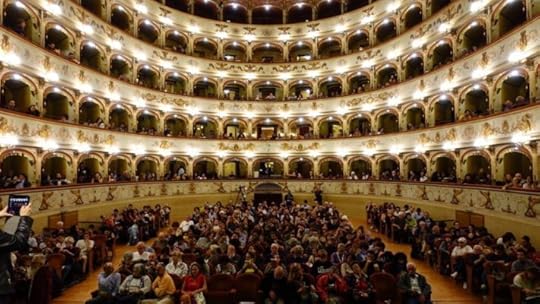
Here’s what happened:
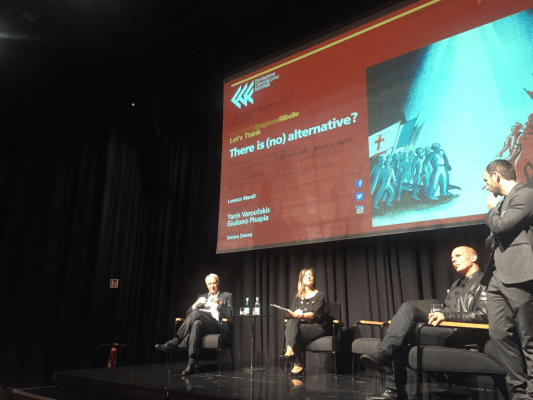
The first stop was Milan on September 27 at the Fondazione Feltrinelli. Titled “There is (no) alternative?: Progressive proposals for Europe”, the event was sold out to the point where the organisers had to set up a second room for it!
Speakers included Milan’s former mayor Giuliano Pisapia and Tonia Mastrobuoni, Berlin correspondent from the paper La Repubblica. The main topic: the need for a large transnational party in Europe, gathering all progressive movements to offer a real alternative to the Establishment and nationalist parties.
Video diary #1 : https://diem25.org/our-italy-tour-kicks-off/ …
Next up, Yanis and Lorenzo visited Turin, at the ‘Festival Proxima del 99%’. Over 600 people attended to hear Yanis and Lorenzo, alongside speakers like Italian trade union leader Maurizio Landini and Nicola Fratoianni, discuss what’s going wrong with left wing politics in Italy, the sinking numbers in electoral turnout and political participation, and how today’s national-level problems can only be resolved if we take into account the transnational dimension.
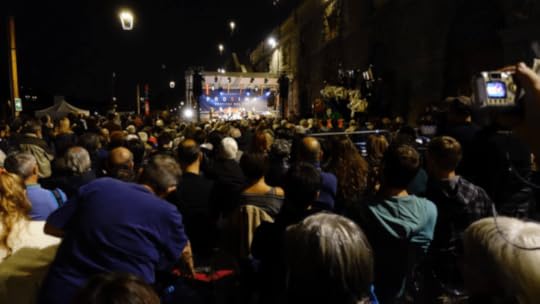
The Festival Internazionale at Ferrara provided the venue for the next tour stop. Speaking to a packed theatre of over 1,000 (mostly young) people – many of whom had been queuing around the block (pictured) – Yanis and Lorenzo outlined the core problems of the EU/Eurozone, and the Establishment’s fake narrative of a ‘North/South divide’ which treats these regions as different worlds with different issues. They also took questions from the audience.
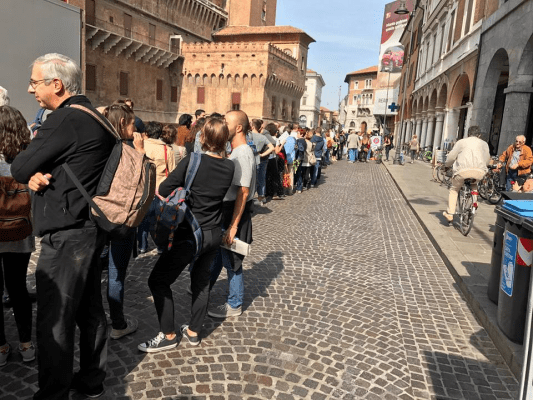
Next came the “Movements and Cities of Europe”, an open assembly in Bologna with the municipal movement Coalizione Civica. Yanis’ speech, calling for a ‘political awakening’, closed the event, and it was very well received by the 500-strong audience.
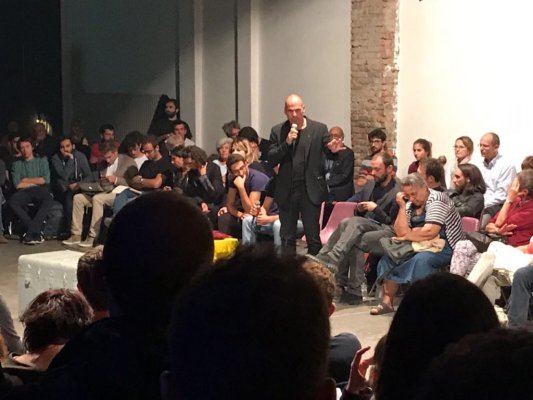
The fifth stop was Naples, where our team joined the first national assembly of DiEM25 in Italy to solidify the activist base there. The event was organised by DiEM25’s local group in the city, DSC Naples 1.
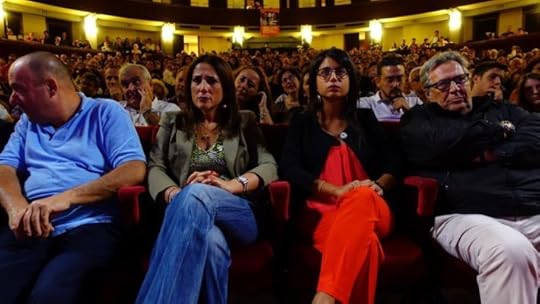
Our team then made a second stop in Naples to speak alongside its mayor, Luigi de Magistris, about the DiEM25’s concept of “rebel cities” – a network of progressive municipalities like Barcelona, Zagreb, Warsaw and Naples itself. Together with Luigi de Magistris and several movements from the city, Yanis and Lorenzo debated how an innovative transnational campaign for the 2019 European elections could look.
The final stop was Palermo on October 1, at an event organised by DiEM25’s local group DSC Palermo2. Titled “Palermo Europe: the future goes from the Mediterranean”, Yanis, Lorenzo and a host of other speakers including Palermo’s mayor discussed how Palermo and the region represented a new model for the welcoming and integration of migrants and refugees, a foundational claim for DiEM25.
The tour also marked the launch of a new initiative “Radio DiEM25 Italia”, with ongoing live videos from our members, DSCs, partners and movements across the country. (Check it out at on the page of DiEM25 Italia.)
The tour might have ended, but the journey has just begun. Stay tuned for future tours and help us spread the word: The time to build a new Europe is now!
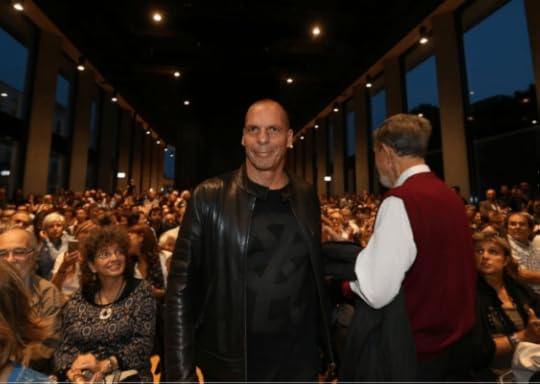
Do you want to be informed of DiEM25’s actions? Sign up here.
October 7, 2017
Why Europe Needs a New Deal, Not Breakup – op-ed in The Nation, with James K. Galbraith

The American New Deal of Franklin Roosevelt’s first two terms combined the goals of financial stabilization, reconstruction, conservation, and employment—jobs for the jobless; public works; power systems and new industries, especially in the South; soil conservation and reforestation to battle the Dust Bowl; and a potent mix of regulations and insurance to assert public power over high finance.
Europe today needs all of these. Its overgrown banks, haunted by the specter of insolvency, are pushing households into foreclosures and evictions across the continent, and at an accelerating scale in the most depressed countries. States are bankrupt and will only become more so as the European Central Bank begins to tighten under pressure from German savers crushed by negative interest rates. Like America 80 years ago, Europe has a vast periphery. In its South, there is a semi-permanent Great Depression, whereas in the East there is great need for new and renewed industries, transport networks, housing, and social investments. Above all, Europeans need jobs.
Unlike the United States in the 1930s, Europe is also facing the menace of disintegration, as the absence of a democratic federal system has spawned a crisis of legitimacy. Paralysis in the face of deindustrialization and chronic unemployment is breeding a toxic politics throughout Europe, with a postmodern form of fascism threatening some countries and a sense of hopelessness elsewhere. Europe has not yet suffered ecological calamities comparable to those in the past few weeks in Texas, Florida, and Puerto Rico; but they are coming, in the form of droughts, rising sea levels, and (most immediately) unstoppable waves of refugees from conflict and climate change in the Middle East and Africa.
The Democracy in Europe Movement 2025 (DiEM25) has therefore proposed a European New Deal (END), inspired by FDR but designed for European conditions. Chief among these is the sad fact that the European Union is a weak and limited thing—a confederacy, more or less. The crisis has made it virtually impossible even to discuss the creation of a US-style federation in Europe, with full powers to budget and mobilize for the emergencies at hand. European polities are so alienated by the authoritarian incompetence of the current leadership—exemplified by the crushing of the Greek government in 2015 and the heavy-handed approach of the European Commission to Brexit—that an increase in central powers (“more Europe,” as they say) would almost certainly meet heavy resistance. So it is necessary to work within existing charters and treaties to bring about stabilization by means of a European New Deal before hope is restored and the creation of new, democratic, federal, pan-European institutions—even a proper European Constitution—can be discussed sensibly and with cool heads.
To this END, we have proposed the following programs for all European countries, independent of whether they are in the European Union or the eurozone:
• A green transition, led by a new agency whose aim is to provide a continent-wide infrastructure focusing on the green Energy Union and the technological sovereignty that Europe desperately needs.
• Economic and social stabilization, principally through a jobs-guarantee program to offer employment to all Europeans seeking work in their home countries. The jobs should pay a decent moderate wage keyed to national conditions, ending the involuntary migration flows within Europe that have been the cause of much discontent, and tied to a food-and-energy-stamps program and to social housing.
• A universal dividend that would allow European citizens to share in the returns of capital and automation, democratizing the economic sphere and preventing the next crisis of low aggregate demand due to the worker- displacement effect of artificial intelligence.
Specifically for the eurozone, we propose a series of therapeutic policy interventions whose great advantage is that they need no European Union treaty changes, but can be implemented under a broad interpretation of existing rules:
• A step-by-step banking union that (a) emulates the creation, by the Roosevelt administration, of the Federal Deposit Insurance Corporation; and (b) restructures all of Europe’s problem banks, placing them under effective social control.
• A program by which the European Central Bank mediates between states and money markets to reduce their total debt burden, but without money-printing or making Germany pay for, or guarantee, the public debt of deficit countries.
• A Chapter 11–like public-debt restructuring facility for unpayable legacy debts (e.g., Greece’s).
How are these programs to be funded in the absence of a federal treasury or a central bank with a suitable remit?
The Green Transition Works Authority will be funded by a combination of (a) the European Investment Bank, which has the capacity to issue the necessary bonds, while the European Central Bank can stand by in the secondary markets ready to purchase the EIB’s bonds, bolster their value, and reduce the interest payments; and (b) a continent-wide carbon tax.
Any retreat to the nation-state will only benefit the xenophobic forces of the ugly right.
For economic and social stabilization, we propose the creation of a European Equity Depository, into which the following income streams will flow: profits from the financial assets purchased by Europe’s central banks (in the context of their monetary operations); other central-bank profits; and a pan-European inheritance tax.
Finally, a percentage of shares from every corporate initial public offering and capital increase should be socialized and transferred to the European Equity Depository. The accumulating dividends, plus levies on the derived distribution of intellectual-property rights and on common-knowledge monopolies, will then fund a universal basic dividend.
Then there is the euro. The currency shared by 19 of the EU’s member states cannot be preserved in its current form, resembling as it does the gold-exchange standard, whose 1929 collapse led to the Great Depression. The euro has political and symbolic importance, both for its champions and its foes, but monetary systems are tools, not ends in themselves. So the euro must either adapt or cease to exist.
The reality is that Europe created a common currency with an inflexible central bank and no federal state; that arrangement has ended in a predictable debt deflation. As a result, already the European monetary system is falling apart. There are countries (Denmark and Britain) that will never join the euro. There are others (Sweden, Poland, and Hungary among them) that are supposed to join in the future but apparently have no intention of doing so. And then there are Cyprus and Greece, which under capital controls have a de facto dual—currency system, since a euro in a Cypriot or Greek bank cannot be exchanged freely for a euro in paper or in another country’s banks. Lastly, some countries in the eurozone would be better off outside, including rich countries like Finland.
Given these realities, the vision of a comprehensive continental currency is not going to be realized. The European establishment must accept that false hope is bad strategy. Work should begin now on a new round of monetary reforms for Europe, giving the indebted countries of the region degrees of freedom without which the grapes of wrath will continue to “grow heavy for the vintage.”
To this effect, DiEM25’s European New Deal is proposing a moderate, technically simple reform: the creation of a public digital-payments platform in every eurozone country. Using the existing digital platform of their nation’s tax office, taxpayers would be given the opportunity to purchase digital tax credits, which they could use to pay one another or to extinguish future taxes at a substantial discount. These credits would be denominated in euros but transferable only between taxpayers of a single country, and would thus be impervious to sharp capital flight. Meanwhile, governments would be able to create a limited number of these “fiscal euros,” to be given to citizens in need or for the funding of public projects.
Fiscal euros would allow stressed governments to stimulate demand, lessen the tax burden, and, ultimately, reduce the crushing power of the European Central Bank. In the long term, these public digital-payment platforms can form a managed system of country-specific euros that work like an International Clearing Union, a modernized version of John Maynard Keynes’s 1944 vision of what the Bretton Woods system should have been like—but, tragically, was not.
DIEM25’s European New Deal provides, we believe, the best chance for holding the European Union together. But should it be held together? Many progressive voices in Europe (and beyond) have been calling for the disbandment of the EU, due to its irredeemably neoliberal architecture, and a return to the nation-state as the realm in which democratic politics can be rebuilt before a new internationalism can spring up again, this time on solid foundations. They point, in much the same way as Burkean Brexiteers did, to the absence of a European demos on which a pan-European democracy can rely.
DiEM25 begs to differ. Societies in Europe are facing four major socioeconomic challenges with the hallmarks of climate change. Just as global warming can never be addressed at the national level, even though local and national action is imperative, the same applies to the crises of (a) public debt, (b) banking, (c) exceptionally low investment (relative to savings), and (d) rising poverty. These will either be dealt with effectively at a European level or not at all, thus ensuring that any retreat to the nation-state will only benefit the xenophobic, militantly parochial forces of the ugly right.
Beyond the practical need for a pan-European approach, DiEM25 embarks from something the left used to understand well: When Marx and Engels adopted their slogan “proletarians of the world unite,” they were not rejecting the importance of national culture or of the nation-state. Instead, they were rejecting the idea of a “national interest” and the view that struggles must prioritize the realm of the nation-state. The notion that we must return to a one-nation/one-parliament/one-demos frame of mind would puzzle the left’s 19th-century pioneers, as it would puzzle progressives of the early and mid-20th century, who dreamed of, and struggled for, a transnational republic from the Atlantic to as far east as possible.
We need a pan-European network of rebel cities, rebel prefectures, and rebel governments.
The left, lest we forget, traditionally opposed the bourgeois belief in a one-to-one relationship between a nation and a sovereign parliament. We counterargued that identity is something we create through political struggle: class struggle, the struggle against patriarchy, the struggle to smash gender and sexual stereotypes, and emancipation from empire, racism, xenophobia, and the practices of mass surveillance.
In today’s Europe, this spirit is not well served by calling for the split of the EU into neatly delineated national realms. DiEM25’s alternative approach is to issue a call to arms to all Europeans to join in what we term “constructive disobedience.” First, we offer a well-thought-out policy agenda for every nook and cranny of Europe, to be implemented at a pan-European level; then, when the establishment predictably turns it down, we embark on massive disobedience, including governmental disobedience (which is what one of us practiced when representing Greece in the Eurogroup in 2015).
In this sense, DiEM25’s European New Deal is the constructive part, which should inspire Europeans regarding what can draw us together into a single, transnational progressive agenda, so that we can organize the disobedience necessary at the local, national, and pan-European level. This is the way forward for progressives seeking practical solutions to problems that wreck the lives of the many across our continent.
DiEM25, therefore, by calling for a pan-European campaign of disobedience with the transnational elites in order to create the European demos that will bring about Europe’s democracy, is in tune with the left’s traditional approach. In this Gramscian spirit, DiEM25 insists that our European rebellion should happen everywhere, in towns, regions, nation-state capitals, and in Brussels, without prioritizing any level over any other. The European New Deal, therefore, is a practical policy agenda for bringing together a pan-European network of rebel cities, rebel prefectures, and rebel governments into a progressive movement that becomes hegemonic in Italy, in Greece, in England—indeed, anywhere in Europe.
Of course, one may cheekily ask: “Why stop at the European level? As internationalists, why don’t you campaign for worldwide democracy—for an International New Deal?” Our answer is that we are doing precisely that (see the July 6 New York Times op-ed by Yanis Varoufakis, “A New Deal for the 21st Century”). Ideally, DiEM25 should link up with a Democracy in the Americas movement, which Bernie Sanders’s “political revolution” could spark, as long as it extends beyond the US-Mexican border to include Latin America. And then onward to the Democracy in the Middle East, Democracy in Asia, and Democracy in Africa movements. But given that history has, for better or worse, delivered an internally borderless European Union, with common policies on the environment and a variety of other realms, progressives must defend our really existing absence of borders, the existing EU commons of climate-change policy, even the Erasmus exchange program that gives young Europeans the opportunity to mingle in a borderless educational system. Turning against these splendid artifacts of an otherwise regressive EU is not consistent with what the left ought to be about.
So, yes, the European Union should and must be saved, and here are just a few of the reasons why:
• Europe has political and social standards for democracy and human rights, as well as for health and safety and the environment, that will not be respected if the continent splits back into national fiefs. In this respect, the cases of Poland and Hungary are already disturbing enough.
• Integrated production networks are efficient, and part of the warp and woof of modern economic life. Disrupting them is extremely costly, as the experiences of the Soviet Union and Yugoslavia showed.
• After a breakup, the smaller countries of Europe will be just as vulnerable to speculative movements of their currencies, the caprices of international investors, and the vagaries of their local oligarchies as they were before the European project got under way.
• Population movements cannot be stopped, and they would become even more toxic politically if new barriers and electrified fences were built. The evidence for this is clear in Britain in the wake of the Brexit vote, and in Austria, Hungary, and elsewhere.
In the long run, Europe needs a democratic governing structure, a proper budget, and the consolidation of many functions now maintained at the national level, with savings in some areas (the military), more uniform and effective protection of the weaker European citizens, greater effective sovereignty at the state and municipal level, and—last but not least—a common approach to the postcapitalist forms of production and distribution made inescapable by new technologies and the energy and environmental crisis.
But this will be possible only after European peoples come to appreciate the continent as a constructive force in their lives—as a visible, palpable, useful presence. And that cannot happen until the structure and ideologies of European economic management have been changed, until there is a full escape from the dysfunctional molds in which those ideas were initially framed.
Is this politically difficult? You bet! But Bernie Sanders and Jeremy Corbyn have shown that clear, sensible ideas—brave enough to challenge the entire existing system, but not unprecedented or utopian—can persuade large numbers of people. Europeans are ready for this. They know that Europe is in danger because it is undemocratic and, consequently, misanthropic when faced with crisis.
Europe now needs an antidote to Euro-TINA: the toxic doctrine that “there is no alternative” within the European Union—except, perhaps, disintegration. That is what the Democracy in Europe Movement, DiEM25, and its European New Deal are about. And this is why we are determined to take our agenda to ballot boxes all over Europe by 2019.
Yanis Varoufakis is the former finance minister of Greece and co-founder of the Democracy in Europe Movement 2025.
James K. Galbraith is the author, most recently, of Welcome to the Poisoned Chalice: The Destruction of Greece and the Future of Europe (Yale University Press, 2016). He teaches at The University of Texas at Austin and is an adviser to the Democracy in Europe Movement 2025.
For The Nation site, were this article was originally published, click here.
October 6, 2017
People, Power & Varoufakis – VPRO documentary, now with English subtitles
Spain’s Crisis is Europe’s Opportunity – Project Syndicate op-ed, 6 OCT 2017
ATHENS – To revive the ailing European project, the ugly conflict between Catalonia’s regional government and the Spanish state may be just what the doctor ordered. A constitutional crisis in a major European Union member state creates a golden opportunity to reconfigure the democratic governance of regional, national, and European institutions, thereby delivering a defensible, and thus sustainable, EU.
For the rest of the article click here
Yanis Varoufakis's Blog
- Yanis Varoufakis's profile
- 2451 followers



